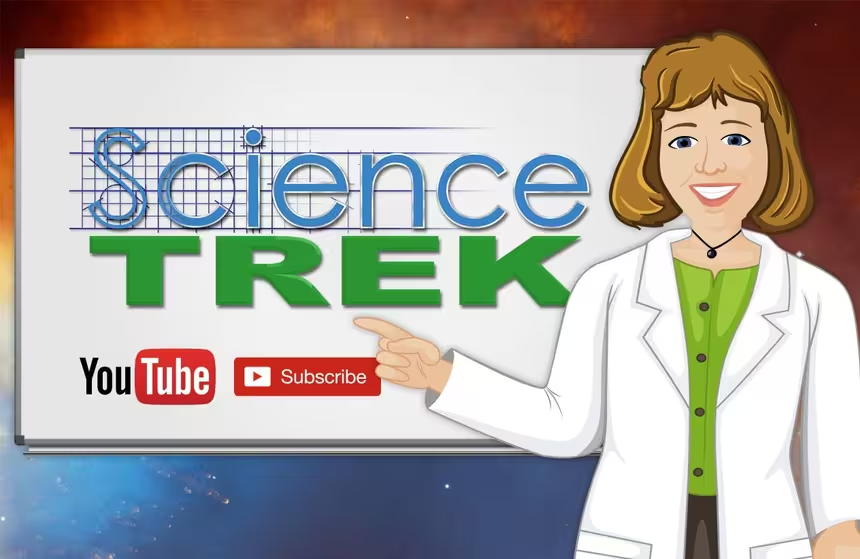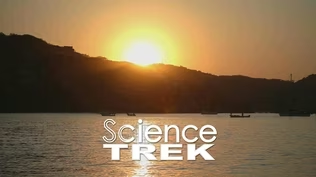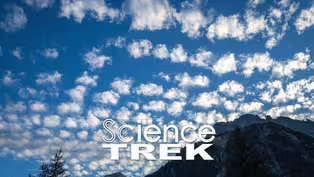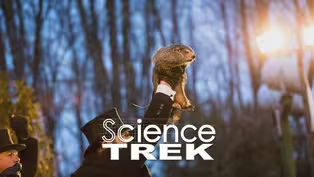
Weather: Blame the Sun
Special | 4m 16sVideo has Closed Captions
What is responsible for the weather?
Sunny, snowing or blowing, the weather affects everything we do. The weather starts with one thing: the Sun.
Problems playing video? | Closed Captioning Feedback
Problems playing video? | Closed Captioning Feedback
Science Trek is a local public television program presented by IdahoPTV
Major Funding by the Laura Moore Cunningham Foundation and the Idaho National Laboratory. Additional Funding by the Friends of Idaho Public Television and the Corporation for Public Broadcasting.

Weather: Blame the Sun
Special | 4m 16sVideo has Closed Captions
Sunny, snowing or blowing, the weather affects everything we do. The weather starts with one thing: the Sun.
Problems playing video? | Closed Captioning Feedback
How to Watch Science Trek
Science Trek is available to stream on pbs.org and the free PBS App, available on iPhone, Apple TV, Android TV, Android smartphones, Amazon Fire TV, Amazon Fire Tablet, Roku, Samsung Smart TV, and Vizio.

Science Trek
Science Trek is a place where parents, kids, and educators can watch short, educational videos on a variety of science topics. Every Monday Science Trek releases a new video that introduces children to math, science, technology, engineering, and math (STEM) career potentials in a fun, informative way.Part of These Collections

Earth Science
Earth Science is the study of the earth. Learn about the place we call home.
View CollectionProviding Support for PBS.org
Learn Moreabout PBS online sponsorshipJoan Cartan-Hansen, Host: The weather impacts everything we do, but what do you know about how weather happens?
Let's find out!
[MUSIC] Student One: Why are we so wet?
Student Two: Because it's raining?
Student One: Why is it raining here?
Student Two: Well, there is only one reason: the sun.
Cartan-Hansen: That' right.you can blame today's weather on the sun.
The sun heats the atmosphere, or the blanket of air surrounding the Earth.
But the sun doesn't warm the Earth evenly.
The temperature on Earth averages about 59 degrees Fahrenheit, but it can get as hot as 136 degrees, or as cold as 129 below zero.
And the differences in temperature results in changes in the weather.
So weather is defined as the state of the atmosphere at a particular time and place.
The study of weather is called Meteorology, and the scientists who try to understand weather patterns and predict the weather are called Meteorologists.
Meteorologists gather lots of data to predict the weather.
They record the temperature, how warm or cold it is.
Whether it's raining or snowing.
That's called precipitation.
They measure wind speed and figure out what the barometric pressure is.
Barometric pressure is the measure of the force of the air.
High pressure generally means good weather, low pressure usually means a storm.
They want to know how much moisture or humidity is in the air.
The more water or humidity in the air, the more likely you are to have clouds.
So, they look at what kind of clouds are in the sky.
There are 10 different categories of clouds, variations on three basic forms; puffy cumulus clouds, layers of stratus clouds, and feathery cirrus clouds.
Fog is simply a cloud that touches the ground.
And when there is enough moisture and the right temperature, and the right amount of pressure, you can get rain or snow or other kinds of precipitation.
When the conditions are just right, you can have some pretty violent weather.
Hurricanes start over the Atlantic Ocean.
They can have wind speeds almost as high as 200 miles per hour, and they can drop over 10 inches of rain.
Whole communities can be wiped out.
You can also get high winds during a tornado.
A tornado is a swirling funnel of air that descends from a cloud.
Tornado winds can get as high as 250 miles per hour.
Lots of scientists like to chase tornadoes so they can study them.
Idaho can get a tornado now and then but they don't happen too often.
Idaho does get lots of snow.
Scientists estimate that a single snowstorm can drop as much as 40 million tons of the white stuff.
So, why do meteorologists study the weather?
Meteorologists like to try and predict the weather for lots of good reasons.
To help farmers know when to plant or to harvest, to help you know what to wear to school.
Scientists can warn residents about the path of a hurricane or when flash flooding might happen.
Meteorologists also study how humans change the weather, with things like global warming, but mostly, meteorologists try to forecast the weather to save people's lives and property.
Student Two: Isn't that interesting?
Student One: Yes, but it still doesn't explain why we are wet.
Student Two: What do you mean?
Student One: We're inside, standing in front of a green screen.
Cartan-Hansen: Because it's all in the name of science!
If you want to learn more about the weather, check out the science trek website.
You'll find it at science trek dot org.
[MUSIC] ANNOUNCER: Presentation of Science Trek on Idaho Public Television is made possible through the generous support of the Laura Moore Cunningham Foundation, committed to fulfilling the Moore and Bettis family legacy of building the great state of Idaho.
By the Idaho National Laboratory, mentoring talent and finding solutions for energy and security challenges, by The Friends of Idaho Public Television, and by the Corporation for Public Broadcasting.
Video has Closed Captions
Clip: Special | 1m 4s | Learn how to identify the clouds in the sky. (1m 4s)
Weather: Can Animals Predict the Weather?
Video has Closed Captions
Clip: Special | 1m 4s | Can animals predict the weather? (1m 4s)
Providing Support for PBS.org
Learn Moreabout PBS online sponsorship
- Science and Nature

Explore scientific discoveries on television's most acclaimed science documentary series.

- Science and Nature

Capturing the splendor of the natural world, from the African plains to the Antarctic ice.
Winnipeg In Bloom











Support for PBS provided by:
Science Trek is a local public television program presented by IdahoPTV
Major Funding by the Laura Moore Cunningham Foundation and the Idaho National Laboratory. Additional Funding by the Friends of Idaho Public Television and the Corporation for Public Broadcasting.


